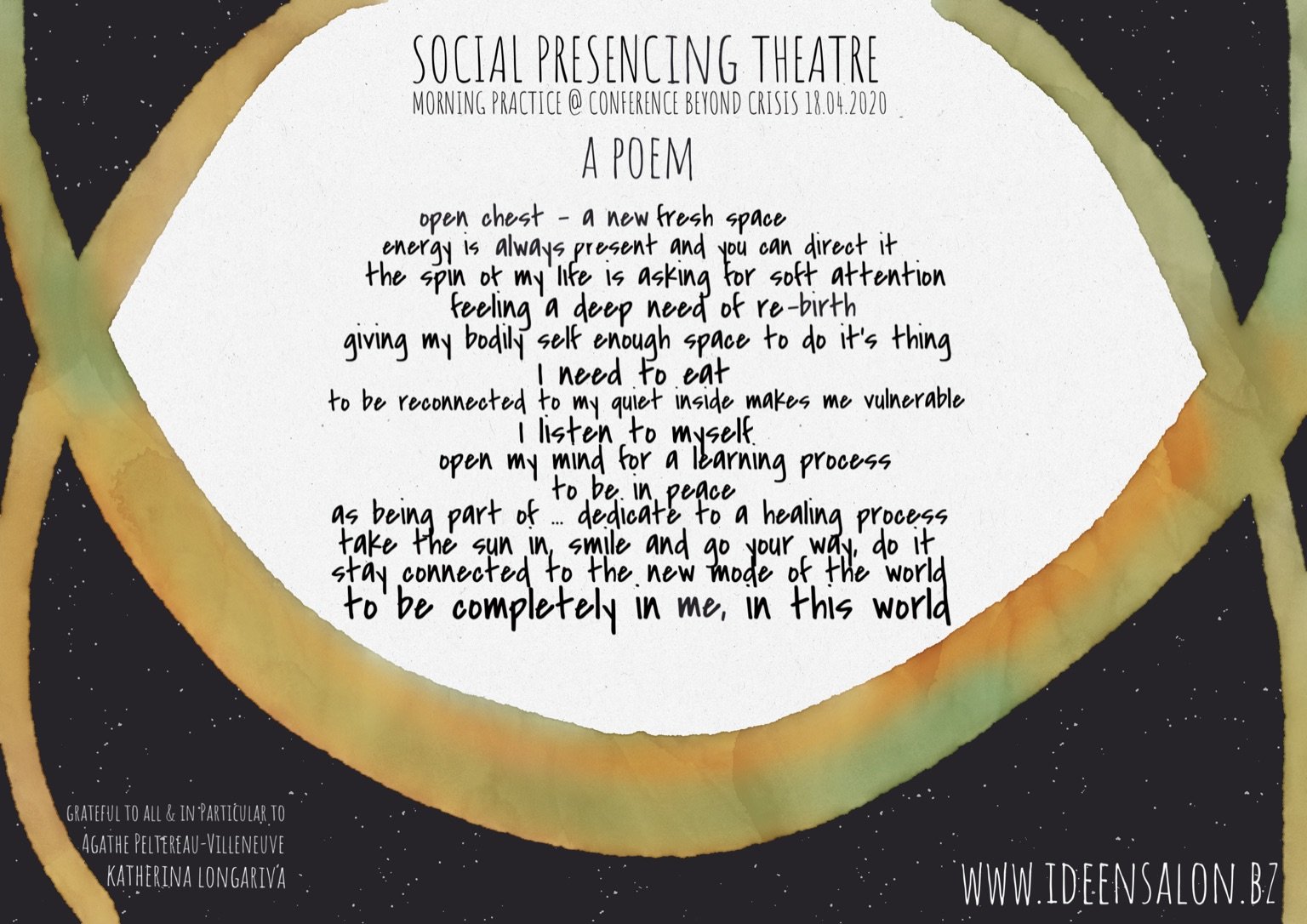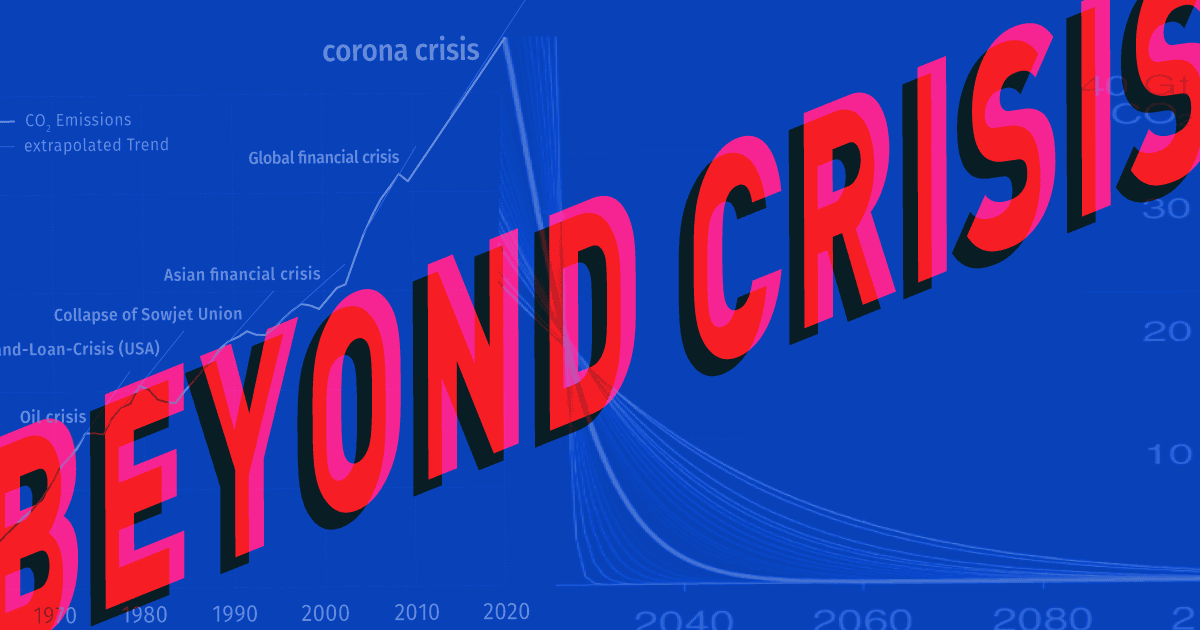Online conference, 17-18 April 2020, MA Eco-Social Design, Free University of Bozen–Bolzano. A public live stream of the inputs of Friday will be available in our youtube channel shortly before the start at 17:00 (Time zone: CEST / UTC+2h).
The documentation page is ready!
Beyond Crisis Outcomes & Next Steps
Danke! Grazie! Thank you!
The conference was prepared within one month only. This was only possible through the collaboration of many people.
Several people from outside unibz joined to help in preparing and conducting the conference:
Cornelia Reindl, Digital facilitator, VUCA-coach, minimalist by conviction
Katharina Kloss, researching on technology-place-narrative interactions, always learning
Katharina Erlacher & Katharina Longariva of blufink, who are organising the Ideensalon, which is an opportunity to continue working on the thematic threads on a local level.
Sabina Frei, facilitator and teacher of the course in Moderation & Participation in the MA Eco-Social Design
Lucas Kuster, who opened the call Corona Futures
The Beyond Crisis Team at the MA Eco-Social Design:
Simon Barthmuß (student), Secil Ugur (Research Fellow & teacher of Design & Production), Jennifer Schubert (Researcher & teacher in Social Interaction Design), Corinna Sy (co-founder of Cucula & project teacher), Merve Bektas (student), Alastair Fuad-Luke (Professor for Design Research), Caterina Laruccia (student), Andrea Gaidano (student), Alvise Mattozzi (Researcher & Teacher in Sociology, Semiology & STS)
Morning Sessions:
Katharina Longariva of blufink & Agathe Peltereau–Villeneuve: Social Presencing Theatre
Stephanie Hobmeier: Yoga
The visual note takers: Pia Pach, Daniel Schiechl, Katharina Kloss, Adele Buffa, Janine Vorfeld, Cristina Dalla Torre, Merve Bektas, Carola Kurz, Vanessa Deotto, Iske Conradie, Noemi Zajzon, Corinna Sy, Andrea Gaidano, Laura Heym, Giulia Fasoli, Caterina Laruccia, Rendy Anoh, Celeste Meisel, Maria Pasqualini, Meike Hollnaicher, Shiri Mahler
All speakers (see below) and the workshop offerers: Raz Godelnik & Friedrich Stephan, Anton Brokow-Loga, Bianca Elzenbaumer, Martina Dandolo & Flora Mammana, Julia Scher & Jennifer Schubert, Sonia Gantioler, Felix Egle, Andrea Fumagalli
I Gigi Saggi, which recorded the concert for the Friday Apertivo, and Lil Deep Sadness for the DJing at the Eco-Social Dance on Saturday night.
Thanks to Laura Popplow, who came up with the idea to organise a conference in her comment on this article.
All contributed freely. Nobody got paid for this extra work, which for some was a huge sleep-steeling workload, and in total is enormous!
How to use the virus-induced situation to build up momentum for social-ecological transformation?
Is the corona crisis an opportunity or threat to social-ecological transformation? There is no reason to be glad about the corona crisis, but it presents an opportunity for creating positive change, and momentum for a transition to solidary, sustainable and resilient modes of production and living. On the other hand, it could also set off a shift towards more surveillance, centralized control, walls and wars, and an ever-more ruthless economic growth, fired by rhetorics such as “now we cannot afford to protect the environment and the social anymore because the economy has to recover quickly!”. How can we establish another leading narrative that encourages positive actions? What can we do now to nourish positive transformations and prevent the dystopian developments? What are the strategies, alliances and actions that can be activated for this purpose? Which framings, narrations, images and aesthetics are promising?
This conference is for generating an overview, and for creating threads of action and next steps. At the end of the conference, we can decide to do a follow-up conference and/or make it an evolving conference series. The participants can set up groups, which continue to work on specific issues. The follow-up conference would weave together all the threads again. And so forth. Simultaneously the networks will grow and make bridges to other networks. Read more about below under Purpose and design of the conference.
Friday, 17 April
Time zone: CEST / UTC+2h
16:30 Room Opening: Moderators giving a technical introduction and providing support (strongly recommended for non-techies)
17:00 Opening: Motivations, Purpose & Aims, Kris ><
17:10 Structure & Procedure of the Conference
17:20 Warm-up in random groups of 4; Where are we? Expanding the now
17:30 9 x 9 Short Inputs, each 9 min.
Harald Welzercancelled- Julia Scher, Academy of Media Arts
- Sina Kamala Kaufmann, science fiction author / Extinction Rebellion.de: European Dream
- Magdalena Heuwieser, co-founder of the global network Stay Grounded: A just transition in the transport sector: Civil society strategies countering aviation bailouts
- Marc Zebisch, EURAC Institute for Earth Observation: The Climate Crisis is COVID-19 in slow motion. So what can we learn?
- Raz Godelnik, Parsons & Peter Friedrich Stephan, Academy of Media Arts: Will the real transformation designer stand up please?
- Saskia Hebert, MA Transformationsdesign / subsolar: Housing the crisis
- Anton Brokow-Loga, ILA Kollektiv: The ‘Corona Crisis’ as a Take-Off Point for Transformations towards a Solidary Mode of Living?
- Bianca Elzenbaumer, Brave New Alps / Marie Sklodowska-Curie Fellow at Eurac Research: Practising the future together – getting going here and now
19:00 What was inspiring for us? – in groups of 4
19:10 Outlook on the Saturday program
19:20 Aperitivo: Salute!
Saturday, 18 April
8:30 – 9:30 Morning Session (optional): Social Presencing Theatre with Katherina Longariva (check-in at 8:20).

10:00 – 12:00 Workshop Jam: 24 diverse workshops in parallel on specific thematic threads (max. 13 participants each; more information coming soon). Please inscribe before Friday, 21:00. More Information and inscription here.
17:00 – 18:00 Workshop outcomes 3 x 3: 3 min. presentations of 3 actions resulting from each workshop
18:00 The most important findings – in groups of 4
18:10 Connecting the dots, Alvise Mattozzi & Alastair Fuad-Luke
18:25 And now? How to go on from here, Kris ><
18:30 Aperitivo: Chin Chin, Bye-bye, ciao ciao & servus!
Purpose and design of the conference
The corona crisis is a turning point, which could lead to more authoritarian, exploitative and destructive futures, or to more solidary and sustainable ones. It can be used as a window of opportunity to create momentum for social-ecological transformation and moving towards free and just societies, economies and cultures. This needs to get going now.
Purpose: Gather people who are engaging in such diverse positive changes in different arenas. Enable a collaborative process to figure out where we are, what to do effectively and how to take action (for example by … see threads of debate and action below).
Threads of debate and action:
to be reviewed in the light of the inputs given through the registration form and the discussion during the conference
- Joining forces of all actors working in this direction, across barriers of ideology, culture, class, etc. (building upon, extending and bridging alliances).
- Drafting narratives and images that mobilize and unite many, and at the same time allows differences
- Elaborating strategies and put them into action (local, trans-local, national, EU and more global)
- Building upon positive phenomena emerging from the crisis (solidarity, coordinated action by politics and public administration across parties)
- Continue the effective cooperation action between science, politics, public administration, civil society and companies
- Fostering commoning, subsistence and sufficiency by (local) practices, trans-local networks, institutional arrangements and policies
- Pushing solidary post-growth on the political agenda, and countering narrative such as “environment and social are luxury we cannot afford now that the economy has to grow again”
- Make pressure to direct economic stimulus programmes into the energy transition, social infrastructures and other aspects of a just green new deal
- Develop democratic global governance based on subsidiarity and participation
- Fighting against measures of control and surveillance, and promoting better alternatives (open technologies and data, policies for open access and transparency, etc.)
- Combating authoritarian measures and forces
- Pushing for international solidarity instead of global competition
- Making use of the revealing of malfunctions of the dominant system by the corona crisis
- Using the now widespread awareness of the fragility of the globalized system, and the need of more resilient structures
- Making use of the new appreciation of what (and who) is really systemically relevant (health care, social system, garbage collection, agriculture and food, etc … and all the people working there)
- Building upon the grown awareness of what really matters (health, meeting friends and family, spending time outside and in “nature”, etc.) and that we need each other
- … and more … to be tackled during the conference and beyond.
Don’t miss our expanding collection of articles and videos on #Corona Transformations! Contributions welcome.
Subscribe to our newsletter to stay up-to-date:Image: The diagram in the background is a mash-up. To see and understand it better you can download this PDF.

Also check out: Yuval Noah Harari: the world after coronavirus
Harari argues convincingly that now was the time for governments to roll out massive surveillance technologies – but also that this was the chance to begin successful, global cooperation. Thanks, Thies
“In recent weeks, some of the most successful efforts to contain the coronavirus epidemic were orchestrated by South Korea, Taiwan and Singapore. While these countries have made some use of tracking applications, they have relied far more on extensive testing, on honest reporting, and on the willing co-operation of a well-informed public.”
https://www.ft.com/content/19d90308-6858-11ea-a3c9-1fe6fedcca75?fbclid=IwAR2umM3G7oyoDrZse4twoKS6sdWpCdXw-jNYU8RkfbvwEDDS8hfmrmjGSpU